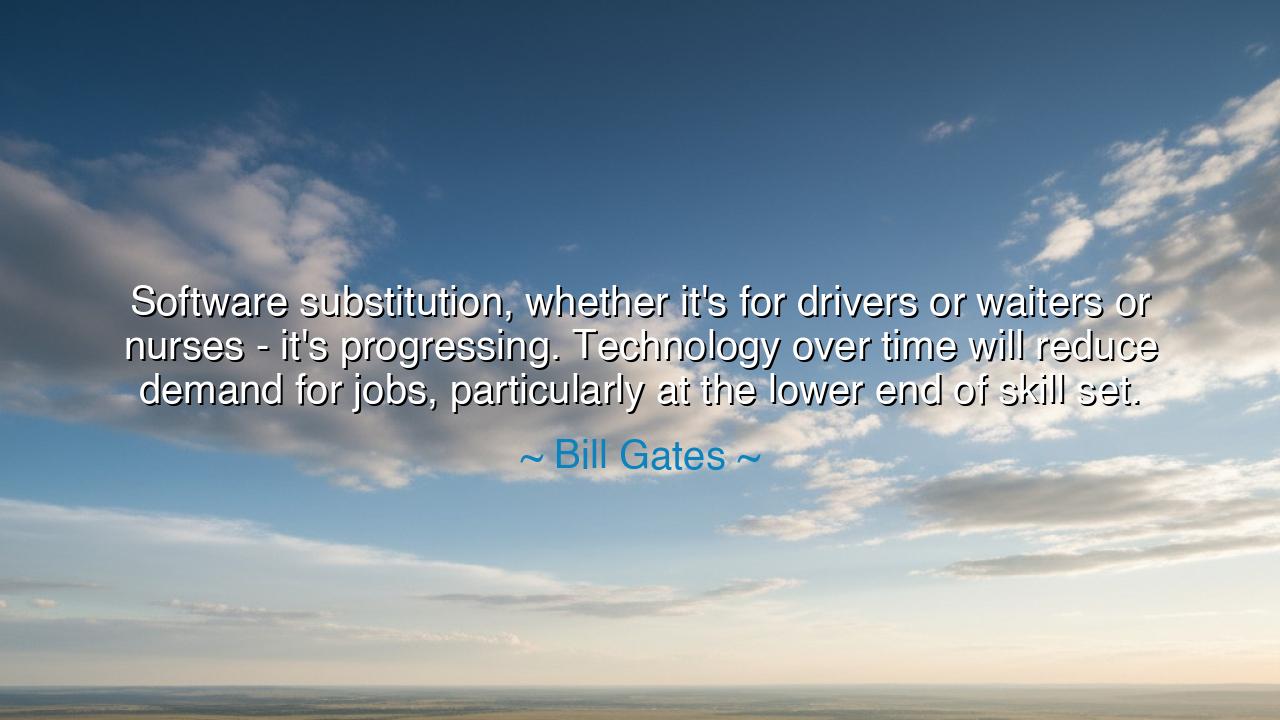
Software substitution, whether it's for drivers or waiters or
Software substitution, whether it's for drivers or waiters or nurses - it's progressing. Technology over time will reduce demand for jobs, particularly at the lower end of skill set.






Bill Gates, a herald of the digital age, spoke with foresight when he declared: “Software substitution, whether it’s for drivers or waiters or nurses – it’s progressing. Technology over time will reduce demand for jobs, particularly at the lower end of skill set.” These words, though they may stir unease, are not a curse but a warning, a reminder that mankind stands always at the edge of change. For every wave of technology that rises carries both promise and peril: promise of greater efficiency, peril of displacing the hands that once labored.
The meaning of Gates’ words is this: software substitution is no longer the dream of science fiction, but the lived reality of our age. Where once men guided plows, machines now till the earth. Where once clerks counted with quills, computers calculate with infinite speed. Now, in our century, even the roles of drivers, waiters, and nurses—roles built not only on skill but on human presence—face the encroachment of algorithms and automation. This is no judgment upon humanity, but simply the unfolding law of invention: that tools grow ever more capable, and what was once the work of flesh becomes the work of code.
This is not without precedent. Recall the Industrial Revolution, when steam and steel replaced countless artisans. The weaver at her loom, the smith at his forge, the craftsman whose skill was his life—many saw their livelihoods swept away by machines that could do in minutes what their hands took hours to complete. Cities swelled with displaced workers, riots broke out, and fear filled the land. Yet in time, new forms of labor arose: factories, railroads, new trades and professions. Society transformed, but not without suffering, not without upheaval. Gates’ warning is an echo of this history, reminding us that the cycle continues, only now at the speed of silicon.
And yet, Gates does not speak only of loss, but of transformation. For while technology reduces demand for some jobs, it also creates new opportunities, new paths unimagined. The disappearance of one role need not mean the death of livelihood, if society prepares its people to adapt. But here lies the challenge: those at the “lower end of the skill set” are most vulnerable, for their roles are often the first to be mechanized, and without foresight, they are left behind in the march of progress. Thus the burden falls upon leaders, teachers, and communities to ensure that progress does not become exclusion, that the rising tide lifts all boats, not just a chosen few.
Consider the tale of Japan after World War II. Out of devastation, the nation invested deeply in education and training, teaching its people to master new tools, new industries. From ruin, it rose to become a powerhouse of technology and manufacturing, precisely because it understood that human beings must evolve alongside their machines. This is the path Gates points toward: not to resist change, for that is futile, but to meet it with preparation, with wisdom, with care for those who stand most at risk.
The lesson, then, is twofold. First: do not cling blindly to roles that will surely change, for to resist progress is to resist the tide itself. Second: build within yourself the skills that cannot be easily replaced—creativity, empathy, critical thought, leadership. For though machines may drive and serve and calculate, they cannot yet dream, nor love, nor create meaning. These gifts remain uniquely human, and in them lies both survival and greatness.
Therefore, O seekers of wisdom, take Gates’ words as both a warning and a call. Learn, adapt, prepare. Let no generation be left unready for the transformations to come. And above all, cultivate the qualities of the spirit that no machine can imitate. For in the end, it is not the substitution of software that will determine humanity’s destiny, but the wisdom with which humanity responds. If we walk with foresight, then technology will not enslave us, but will instead liberate us to higher callings, to nobler labors, and to the unfolding of a future worthy of our kind.






AAdministratorAdministrator
Welcome, honored guests. Please leave a comment, we will respond soon